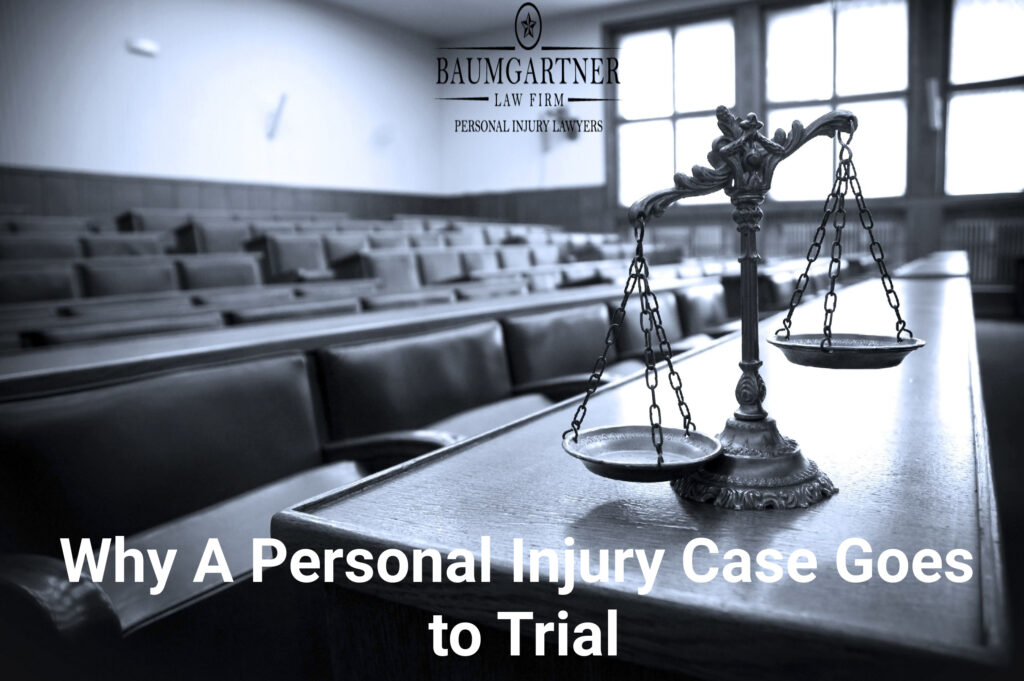If you’ve been involved in a personal injury case, wonder why the case is going to trial. After all, most personal injury cases are settled outside of court. However, certain circumstances may lead to a trial. Harris County personal injury attorney Greg Baumgartner discusses why a personal injury case may go to trial and what to expect during the trial process.

Understanding Personal Injury Lawsuits
Before we dive into why your case may be going to trial, it’s important to understand the basics of personal injury cases. A personal injury lawsuit is filed when one person claims harm from an accident caused by another who may be legally responsible. Personal injury laws include car accidents, slips and falls, construction site accidents, and more.
In most personal injury cases, the injured party, the plaintiff, will file a claim against the person or entity responsible for their injuries, the defendant. The defendant’s insurance company will typically handle the claim and try to negotiate a settlement with the plaintiff. However, the case may go to trial if a settlement cannot be reached.
Reasons Why Your Personal Injury Case May Go to Trial
Disagreement on Liability
One of the main reasons why a personal injury case may go to trial is a disagreement on liability. Liability is who is legally responsible for the accident or injury. Sometimes, the defendant may deny liability and refuse to accept responsibility for the plaintiff’s injuries. Texas is a proportionate responsibility state, meaning the fault of everyone is assessed. Damages are reduced if the defendant’s fault is less than 100%. In such cases, having a knowledgeable personal injury lawyer Houston advocating for you becomes crucial. When you are injured in an accident, you may require medical treatment.
If the plaintiff is assessed more than 50% of the fault, they get no money for the case in Texas.
Fault disagreements can lead to a stalemate in settlement negotiations and ultimately result in a trial.
Disagreement on Damages
A disagreement on damages is another reason a personal injury case may go to trial. Damages refer to the financial compensation the personal injury victims seek for their injuries. The defendant’s insurance company may dispute the extent of the plaintiff’s injuries or the compensation they seek. Damage disputes can lead to a trial where a jury will determine how much damages to be awarded.
Disagreement on the amount of damages is the most common reason a personal injury lawyer takes the case to trial.
Failure to Negotiate a Fair Settlement
Sometimes, the defendant’s insurance company may refuse to offer a fair settlement amount. Lowball offers can happen when they claim the plaintiff’s injuries are not as serious as claimed or if they are trying to save money. The case may go to trial if the plaintiff and defendant are far apart on damages.
Conversely, some cases do not settle because the plaintiff has unrealistic expectations and the demand made is unrealistic. Also, the plaintiff’s lawyer may have demanded too high of a number that the insurance company felt was not in the ballpark to spark negotiations.
Complex or High-Value Cases
Some personal injury cases are more complex or have a higher value, making it difficult to reach a settlement agreement. Both parties may feel that a trial is necessary to ensure a fair outcome in these cases. Complex cases may involve multiple defendants, extensive injuries, or disputed liability.
High-value cases may involve significant financial compensation, making it more likely for the defendant’s insurance company to fight the claim.
The more parties involved in a lawsuit, the more likely a trial will be needed.
personal injury lawyer Greg Baumgartner
What to Expect During the Trial Process
If your personal injury case is going to trial. Here are the basic steps involved in a personal injury trial:
Jury Selection
The first step in a personal injury trial is selecting a jury. The plaintiff and defendant’s attorneys will have the opportunity to question potential jurors and select a jury they believe will be fair and impartial.
Opening Statements
Once the jury is selected, both attorneys will have the opportunity to make opening statements. These statements provide an overview of the case and what each side will be arguing.
Presentation of Evidence
After opening statements, the plaintiff’s attorney will present evidence to support their case. Evidence may include medical records, illustrations, witness testimony, and expert opinions. The defendant’s attorney will then have the opportunity to cross-examine the plaintiff’s witnesses and present their evidence.
Closing Arguments
Once all evidence has been presented, both attorneys will have the opportunity to make closing arguments. These arguments summarize the evidence and attempt to persuade the jury to rule in their favor.
Jury Deliberation and Verdict
After closing arguments, the jury will deliberate and come to a verdict. Sometimes, the judge may make the final decision instead of a jury. The verdict will determine whether the defendant is liable for the plaintiff’s injuries and the amount of damages to be awarded.
Appeal Process
They may appeal the decision if either party is unhappy with the verdict. Appeals can prolong the legal process and may result in a retrial.
The Importance of a Trial Attorney
If your personal injury case is going to trial, it’s crucial to have a skilled trial attorney on your side. Trial attorneys have experience in the courtroom and know the rules of evidence and procedures involved in a trial. They can effectively present evidence, cross-examine witnesses, and make compelling arguments to the jury.
While most personal injury cases are settled outside of court, certain circumstances may lead to a trial. Disagreements on liability or damages, failure to negotiate a fair settlement, and complex or high-value cases are why a personal injury case may go to trial. If your case is going to trial, having a skilled trial attorney on your side is important to ensure a fair outcome.
Contact the Personal Injury Trial Law Firm in Houston at Baumgartner Law Firm for Help!

The Baumgartner Law Firm was founded in 1985 to provide a serious lawyer as an advocate for personal injury victims with serious injuries.
Contact Baumgartner Law Firm for a no-obligation consultation about your rights and options after an accident.
6711 Cypress Creek Pkwy, Houston, TX, 77069
(281) 587-1111
Related personal injury trial resources:
The Likelihood of Your Car Accident Case Going to Court
Steps for Filing a Personal Injury Lawsuit in Texas
Admissibility of Police Officer Opinions
Relevance of Evidence in a Personal Injury Case in Texas
What Percentage Do Most Personal Injury Lawyers Take?
How Much Is My Personal Injury Case Worth?
